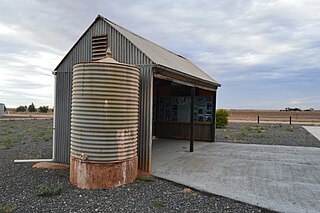
The Town of Gawler is a local government area located north of Adelaide city centre in South Australia containing Gawler and its suburbs. The corporate town was established in 1857 due to the township's residents' dissatisfaction at being governed by three different district councils.

The Adelaide Plains is a plain in South Australia lying between the coast on the west and the Mount Lofty Ranges on the east. The southernmost tip of the plain is in the southern seaside suburbs of Adelaide around Brighton at the foot of the O'Halloran Hill escarpment with the south Hummocks Range and Wakefield River roughly approximating the northern boundary.

Two Wells is a town approximately 40 kilometres north of the Adelaide city centre in South Australia adjacent to Port Wakefield Road and passed by the Adelaide-Port Augusta railway line. The first settlers in the area used two aboriginal wells in the area as a freshwater source. At the 2016 census, Two Wells had a population of 1926.

Wasleys is a small town north-west of Gawler, South Australia. Roseworthy College is located around 6 km (3.7 mi) south of the town. At the 2016 census, Wasleys had a population of 348.

The Adelaide Plains Council is a local government area in South Australia. It consists of a largely rural region along the Gulf St Vincent, covering a total area of approximately 926 km2. The council seat lies at Mallala, but it also maintains a service centre at Two Wells.
Port Gawler is a locality and former port on Gulf St Vincent on the central Adelaide Plains in South Australia. Port Gawler is located 43 kilometres (27 mi) north west of Adelaide in the Adelaide Plains Council local government area at the mouth of the Gawler River.
Stanley was an electoral district of the House of Assembly in the Australian state of South Australia.

The Hundred of Port Gawler is a cadastral unit of hundred located on the central Adelaide Plains in South Australia and bounded on the south by the Gawler River. It is centred on the town of Two Wells with the locality of Port Gawler at the south western corner of its boundary. It is one of the eight hundreds of the County of Gawler. It was named in 1851 by Governor Henry Young either directly or indirectly after the former Governor George Gawler.

The County of Gawler is one of the 49 cadastral counties of South Australia. It was proclaimed in 1842 by Governor George Grey and named for the former Governor George Gawler. It is bounded by the Wakefield River in the north, Gulf St Vincent in the west, the approximate path of Horrocks Highway in the east, and the Gawler River in the south.
The Hundred of Dublin is a cadastral unit of hundred located on the northern Adelaide Plains of South Australia spanning the township of Dublin and surrounds. It is one of the eight hundreds of the County of Gawler. It was proclaimed in 1856 by Governor Anthony Musgrave and named by Governor Richard Graves MacDonnell after Dublin, Ireland, where he was born.

Grace Plains is a rural locality in South Australia on the northern Adelaide Plains about 64 kilometres (40 mi) north of the state capital of Adelaide. It is divided between the Adelaide Plains Council and the Wakefield Regional Council. The formal boundaries were established in June 1997 for the long established local name with respect of the section in the District Council of Mallala ; the portion in the Wakefield council was added in January 2000. It is named after Grace Montgomery Farrell, widow of Rev C. B. Howard, the first South Australian Colonial Chaplain; she later married James Farrell, Dean of Adelaide.
The District Council of Port Gawler was a local government area in South Australia from 1856 to 1935. It was proclaimed on 11 September 1856 after being severed from the District Council of Mudla Wirra.
The District Council of Balaklava was a local government area seated at Balaklava in South Australia from 1877 to 1983.
The District Council of Light was a local government area in South Australia from 1867 to 1892.

The District Council of Dublin was a local government area in South Australia from 1873 to 1935, seated at Dublin.
The District Council of Grace was a local government area in South Australia from 1874 to 1935, seated at Mallala.
The Hundred of Para Wirra is a cadastral hundred of the County of Adelaide, South Australia, spanning a portion of the Adelaide Hills north of the Torrens Valley including Mount Crawford.

The Hundred of Alma is a cadastral unit of hundred located on the northern Adelaide Plains of South Australia spanning the township of Alma and the Alma Plains. The hundred was proclaimed in 1856 in the County of Gawler and named by Governor Richard Graves MacDonnell for the River Alma on the Crimean Peninsula, the location of the Battle of the Alma, the first Allied victory in the Crimean War. The hundred is bounded on the north by the Wakefield River and on the south by the Light River

The Hundred of Mudla Wirra is a cadastral unit of hundred located on the northern Adelaide Plains of South Australia, first proclaimed in 1847. The hundred is bounded on the north by the Light River and on the south by the Gawler River.

The Hundred of Nuriootpa is a cadastral unit of hundred in the County of Light, South Australia split between in the eastern Adelaide Plains and western Barossa Valley. Named in 1847 for an indigenous term officially thought to mean "bartering place" and traditionally used as neutral ground for trading between various indigenous tribes, it is bounded on the south and east by the North Para River.














